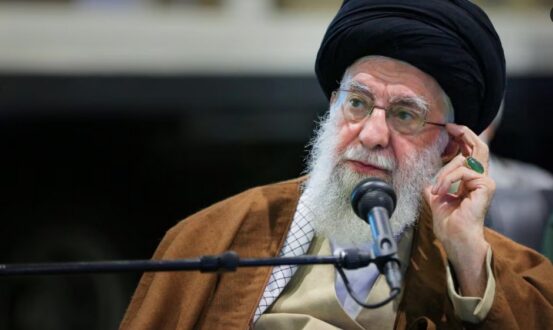iranintl – Iran’s 84-year-old ruler Ali Khamenei’s recent claim that God once spoke through him has led to sharp criticism and ridicule in the Iranian social media space.
On December 31, Khamenei was meeting with the family of former IRGC operative Qasem Soleimani, when he suddenly claimed that more than 20 years ago, he was in the company of a group of Revolutionary Guard officers when he started conveying an inspirational message to them.
“The Almighty God was speaking! In fact, it was my tongue, but it was God’s words; it was a very extraordinary session,” Khamenei claimed, and added, “It had a significant impact.”
In Islamic theology, Khamenei’s assertion that God spoke through him can be considered blasphemous. According to religious teachings, God communicated exclusively with Prophet Mohammed, as emphasized by some Iranian critics in the past two days. In Shiite oral traditions, there is no mention of any occasion where God spoke to Imam Ali, the revered figure in the faith, or to any other saint.
A well-known Iranian literary critic in exile and political commentator, Faraj Sarkouhi wrote on X, “Megalomania, self-centeredness, self-deification, claiming to be a prophet or the voice of God, a sense of exceptional wisdom, and extreme narcissism are considered characteristics of despots at the end of their reigns. Despots gradually fall into the trap of power, oblivious to the fragility of authoritarian power.”
Some social media users also considered Khamenei’s statements blasphemous and in contradiction with Islamic teachings. An Iranian social media user commented that “According to the Islamic Penal Code, which is used to suppress anti-government dissent, Khamenei’s statements are punishable.”
Another individual wrote on X that “If an ordinary person had uttered the same statement, they would have been executed on charges of blasphemy, insulting sanctities, insulting the Supreme Leader, blasphemy against the Imams, and more.”
Iranian experts generally agree that after being selected as Supreme Leader in 1989, Khamenei kept a much lower profile for many years, appearing relatively rational and reasonable in domestic politics. However, as years progressed and he replaced top military and intelligence personnel, he became more authoritarian and even senior ayatollahs began showing reverence to him. He subdued influential figures of the revolutionary years and made Shiite seminaries subservient to him. Another social media user questioned the silence of senior ayatollahs in the face of Khamenei’s unprecedented statement.
With his growing authoritarianism and his regime’s readiness to kill thousands of protesters in the streets and in prisons, Khamenei’s legitimacy has seriously suffered since 2009.
During protests since 2019, he has been the target of angry chants and derogatory insults. People routinely call him a dictator and blame him for the ever-worsening economy and living conditions.
So far, the reaction of officials to the scandal has been limited. Tasnim news website, affiliated with the Revolutionary Guard, published a rebuttal on Tuesday. An official from Imam Khomeini’s foundation wrote in Tasnim that attacks against Khamenei are orchestrated by foreign-based Persian-language media networks. This refers to Iran International, BBC and Voice of America Persian services, Manoto TV based in London and others.
At the same time, Mehdi Fazaeli, a member of the office for the preservation and dissemination of Khamenei’s works and one of his close associates, on January 1st, dismissed reports about the illness of the Supreme Leader, labeling it as “psychological operations by the enemies.”
 Shabtabnews In this dark night, I have lost my way – Arise from a corner, oh you the star of guidance.
Shabtabnews In this dark night, I have lost my way – Arise from a corner, oh you the star of guidance.



